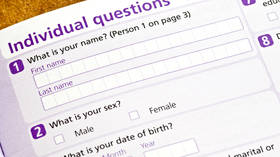Letting people self-identify gender in a census is another step towards erasing women completely

Since 1801, the UK has carried out a census of its population once every decade. To most people, it’s just another task to complete: a few questions to answer, some boxes to tick, job done. Almost every country on Earth holds a census – the compiling and counting has become integral to our understanding of what makes a nation and who is a citizen.
In the UK, the census provides us with an important historical record, while also serving a vital administrative and economic function in the present. Knowing how many people live where steers the allocation of resources, and being aware of their age and sex helps fine-tune this process. After all, there is little point in building a new primary school in a town with a rapidly ageing population.
Counting people is not complicated. But this time around, the census has become mired in controversy. First, there was Covid. While people in England and Wales were deemed able to complete an online form during a pandemic – and did so back in March this year – the Scottish government took a different view. There, the census has been postponed until 2022.
But the census compilers have faced a problem even trickier than Covid: the sex question. How do you tell whether someone is a man or a woman? Oddly, back in 1801, our ancestors needed little help with this. There were no footnotes, no lengthy definitions to grapple with, no protests, and no legal battles. In 200 years of census-taking, the issue of which box to tick if you were non-binary, pan-gender, or a gender-queer demiboy simply never arose. Imagine that!
In 2021, things are very different. England and Wales were first to tackle this thorny problem. The Office for National Statistics (ONS) initially proposed that sex was an ‘umbrella term’ that referred to ‘self-identity’. They advised those still confused not to check between their legs, but to look at an official document like a birth certificate or passport and see what was recorded there. Only, there’s a problem: passports are not a legal record of a person’s sex at all. The gender recorded on a person’s passport can be changed with just a doctor’s note. Thankfully, the campaign group Fair Play for Women brought a judicial review of the matter – which the ONS promptly lost – and in England and Wales the census returned to a purely legal and biological definition of sex.
Now it is Scotland’s turn. National Records of Scotland (NRS), the organisation responsible for organising the census, has clearly learnt nothing from England’s experience. This week it has issued guidance telling people that when it comes to the question on sex, they should answer according to how they self-identify, regardless of the details on their birth certificate or whether or not they have a gender recognition certificate.
NRS specifies, “If you are transgender the answer you give can be different from what is on your birth certificate. You do not need a gender recognition certificate.” In other words, Scottish citizens completing the census are free to ignore biology and legal records and state their gender according to how they happen to feel at the moment they complete the survey. In fact, flying in the face of the English court judgement, NRS advises, “If you are non-binary or you are not sure how to answer, you could use the sex registered on your official documents, such as your passport.” But – just as in England – sex on a passport can be altered without a formal legal process.
As things stand, the Scottish census disregards sex and instead records gender identity. But – as the NRS fully understands – these are two very different things. In the name of appeasing a tiny minority of transgender people seeking validation of their identity through an official survey, the entire category of sex is effectively abolished. This means that the data gathered cannot lay claim to any objective accuracy – it is merely a snapshot of how people feel at a certain point in time. It becomes impossible to draw historical or geographical comparisons. The census itself becomes meaningless: it no longer tells us how many people, of what age and sex, live where.
This matters. As much as transgender activists may wish it were otherwise, some services are very much sex-based. The census helps governments allocate resources. Knowing how many women live in an area helps make the case for money to be put into providing cervical smear tests at a local doctor’s surgery, building a fertility clinic, or refurbishing a maternity unit. Similarly, campaigners are battling hard to keep domestic violence refuges, hospital wards, public toilets, and prisons as single-sex spaces. Altering the definition of sex – and therefore of ‘woman’ – on a document as important as the census makes their job all the more difficult.
A country that cannot clearly define sex in relation to biology cannot claim to be able to accurately gather data. A country that cannot define sex cannot count the number of women in its population and cannot defend women’s sex-based rights. A century ago, suffragettes fought for women’s right to vote and, in the decades since, generations of feminists have continued the fight. Unless we act quickly, their struggles may have been in vain. Women may find they have simply been defined out of existence.
https://www.rt.com/op-ed/533658-scotland-census-self-identify-gender/

No comments:
Post a Comment